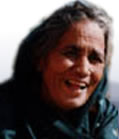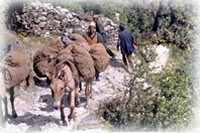 |
 |
||
 |
|||
|
RELATED THEMES development employment and income social change tourism OTHER LOCAL THEMES BACKGROUND |
communications
While loss of local resources is probably the most significant problem associated with road-building, there are social costs too: some narrators say they no longer feel safe and claim that crime has increased. "There is danger now on account of the roads. Miscreants have come into the village. And the paths on which only we used to walk are now full of many new kinds of people." (India 6). Some explain how the increased presence of outsiders has affected women's mobility: "Earlier, we lived in peace, there was no fear of any kind. Womenfolk used to walk without fear, there were no bad characters. These seem to have come in because of the road." (India 29) Most narrators, however, while recognising the problems which roads bring, see them as a basic prerequisite for development. One man (India 12) warns that to take full advantage of roads, villagers must have control over their resources: "People believe that if there are roads in the village, development has taken place. What is the direct benefit of having a road in our village, and how does it affect development? ...The people here are connected not with roads but with their forests. The grass will go, the trees will go, the stone will go from our village. [but] we can grow good vegetables, fruits and make baskets.use colourful stone in handicraft and sell them to other places." Several narrators mention the impact of TV and radio but not in great detail. Access varies, partly due to lack of electricity. One narrator (India 14) says, "I have never seen [a TV], nor have I heard anything. Nobody has [a radio] in our area", while others complain that in their communities young people spend far too much time watching TV. One narrator (India 24) stresses the benefit of modern communications: "I think that families are getting better informed about our own country and the outside world." quotes about communications"Yes, there has been change [since the road came]. the availability of grass and firewood has dwindled. Now people come from far distant places. They cut grass and firewood, put it on the buses and take it away. The result is that there is a crisis for us. We like the thought that we can go here and there in automobiles. But the grass and firewood has been cleaned out." "In the past we had to walk many miles on foot but today we walk only one kilometre to reach the highway. Due to the facility of buses, other kinds of development are also reaching the villages." "Yes, the road has made things simpler. We get everything so quickly. It's nice for us to go to other places. [before] only the rich could go on a pilgrimage. Everybody had to walk up to Simla, which is about 250 km. All the rations, bedding clothes etc had to be carried by us. there was no road. Now everything has changed." "There are many festivals when people sit at home, sing and narrate interesting episodes and jokes.But nowadays this practice is getting lost [and being] replaced by TV, radio, cinema, transistor, sports, wrestling, drama etc. People are getting more inclined towards the modern kinds of entertainment. This is all due to education. Today they can watch the best of competitions, games, sports - not only national but international - on the TV." "TV shows us good things as well as bad. We learned the good things but children are learning even the bad things. My grandson sits glued to the TV. He speaks in Hindi. He has always stayed away from the village, so he has forgotten the native language (Garhwali)." ".if the roads now reach those villages which have not got them, it is perfectly all right.. Only really a wicked person would think that development should only come to him." |
|
 Many narrators live in villages which until recently were not accessible by road. Some recall with pride the long journeys they used to make on foot and the loads they carried on their backs to bring in essential items. Although roads have made such labour a thing of the past for many villagers, and increased their access to markets, schools and medical facilities, they have also had negative impacts. This area is rich in natural resources, which local people depend on for their livelihoods, and the roads have opened these up to outsiders. In addition, road construction has taken up farm and forest land and sometimes left the environment prone to landslips and erosion. One narrator (India 3) makes a desperate plea to stop construction:
Many narrators live in villages which until recently were not accessible by road. Some recall with pride the long journeys they used to make on foot and the loads they carried on their backs to bring in essential items. Although roads have made such labour a thing of the past for many villagers, and increased their access to markets, schools and medical facilities, they have also had negative impacts. This area is rich in natural resources, which local people depend on for their livelihoods, and the roads have opened these up to outsiders. In addition, road construction has taken up farm and forest land and sometimes left the environment prone to landslips and erosion. One narrator (India 3) makes a desperate plea to stop construction: